三级语法1
英语三级(一)

名词的数
不可数名词:
advice, baggage, luggage, bread, cake, cash, equipment, furniture, information, knowledge, money, news, traffic, trouble, work, chalk, chocolate, cloth, fruit, gold, ink, mail, paper, soap, sugar a piece of advice, a basket of fruit, an item of information a(n) piece (sheet, tube, item, bar) of …..
Examples
This is a Mary's dictionary.
This is Mary's dictionary.
There are much people in the garden.
名词(Nouns )
名词的分类 专有名词:指人名、地名、国名等 普通名词:可数、不可数
名词的数
1. 规则变化 1) 一般在名词后加s: books, maps, keys 2) 以s, sh, x, ch结尾的, 加es: bus----buses, brush-----brushes, box----boxes, bench----benches 3) 以 f, fe 结尾的,去掉f, fe, 加ves: shelf----shelves, life----lives, knife-----knives 特殊:roof----roofs, chief----chiefs, safe-----safes, brief----briefs 4) 以o结尾的, 加es: potato----potatoes, hero----heroes, tomato---tomatoes 特殊:radio----radios, photo----photos, zoo----zoos 5) 以y结尾的, 若y前为辅音, 去掉y, 加ies: baby----babies, lady---ladies, factory----factories
天津英语水平考试三级模拟试题语法1
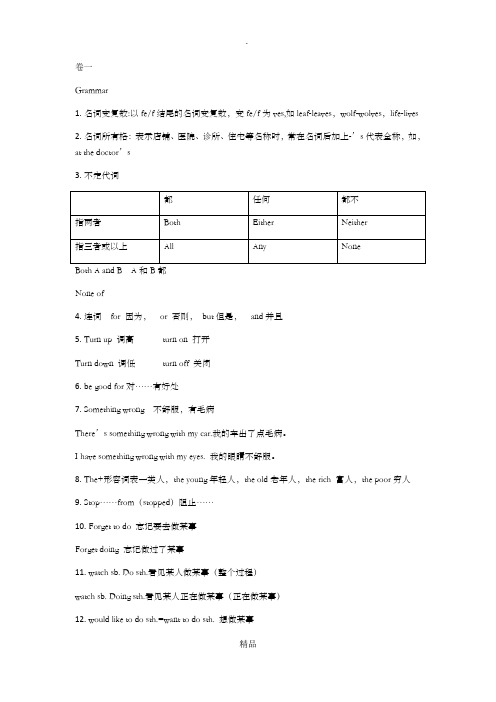
卷一
Grammar
1.名词变复数:以fe/f结尾的名词变复数,变fe/f为ves,如leaf-leaves,wolf-wolves,life-lives
2.名词所有格:表示店铺、医院、诊所、住宅等名称时,常在名词后加上-’s代表全称,如,at the doctor’s
3.不定代词
None of
4.连词for 因为,or 否则,but但是,and并且
5.Turn up 调高turn on 打开
Turn down 调低turn off 关闭
6.be good for对……有好处
7.Something wrong 不舒服,有毛病
There’s something wrong with my car.我的车出了点毛病。
I have something wrong with my eyes. 我的眼睛不舒服。
8.The+形容词表一类人,the young年轻人,the old老年人,the rich 富人,the poor穷人
9.Stop……from(stopped)阻止……
10.Forget to do 忘记要去做某事
Forget doing 忘记做过了某事
11.watch sb. Do sth.看见某人做某事(整个过程)
watch sb. Doing sth.看见某人正在做某事(正在做某事)
12.would like to do sth.=want to do sth. 想做某事。
3级英语语法

英语三级考试讲义一.语法1.1动词的时态1.1.1一般现在时1、表示经常发生的动作或存在的状态:常和always, usually, often ,sometimes, every day, every week的等时间状语连用。
例:He goes to work every day. 他每天去上班。
2、表示普遍的真理。
由于是众所周知的客观事实,所以一般不用时间状语。
例:The earth is round. 地球是圆的。
3、有些表示心理状态或感情的动词往往用一般现在时。
例:I don’t think you are right.我以为你错了。
4、在时间、条件状语从句中表示将来的动作:常用的连词有as soon as,when,till,if。
(1)They will go home for winter vocation as soon as they ________their exams.A. have finishedB. finishC. finishedD. was finishing(答案:B)(1996年22题)(2)When the mixture ______, it will give off a powerful force.A. will heatB. will be heatedC. is heatedD. has heated(答案:C)(1992年59题)1.1.2 一般过去时1、表示过去的动作或状态:常和过去时间状语连用。
just now, last year, when I was 8years old 等。
例:You've already missed too many classes this term .You _____ two classes just last week.A. missedB. would missC. had missedD. have missed(答案:A。
新汉语水平考试大纲语法部分(1-3级)
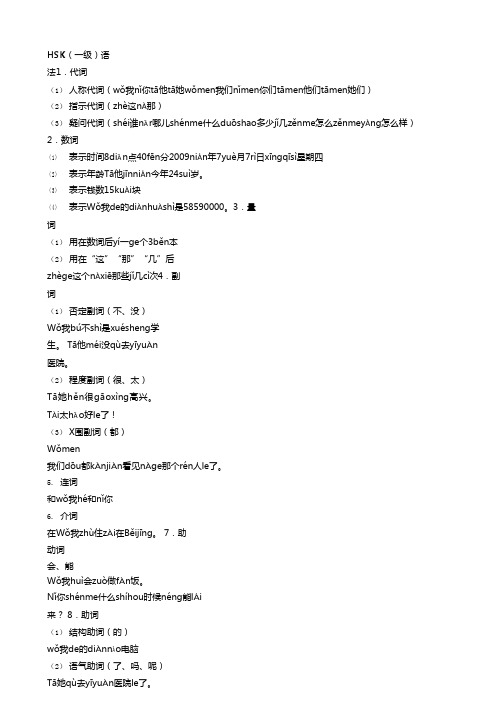
HSK(一级)语法1.代词(1)人称代词(wǒ我nǐ你tā他tā她wǒmen我们nǐmen你们tāmen他们tāmen她们)(2)指示代词(zhè这nÀ那)(3)疑问代词(shéi谁nǍr哪儿shénme什么duōshao多少jǐ几zěnme怎么zěnmeyÀng怎么样)2.数词(1)表示时间8diǍn点40fēn分2009niÁn年7yuè月7rì日xīngqīsì星期四(2)表示年龄Tā他jīnniÁn今年24suì岁。
(3)表示钱数15kuÀi块(4)表示Wǒ我de的diÀnhuÀshì是58590000。
3.量词(1)用在数词后yí一ge个3běn本(2)用在“这”“那”“几”后zhège这个nÀxiē那些jǐ几cì次4.副词(1)否定副词(不、没)Wǒ我bú不s hì是xuésheng学生。
Tā他méi没qù去yīyuÀn医院。
(2)程度副词(很、太)Tā她hěn很gāoxìng高兴。
TÀi太hǍo好le了!(3)X围副词(都)Wǒmen我们dōu都kÀnjiÀn看见nÀge那个rén人le了。
5.连词和wǒ我hé和nǐ你6.介词在Wǒ我z hù住zÀi在Běijīng。
7.助动词会、能Wǒ我huì会zuò做fÀn饭。
Nǐ你shénme什么shíhou时候néng能lÁi来? 8.助词(1)结构助词(的)wǒ我de的diÀnnǍo电脑(2)语气助词(了、吗、呢)Tā她qù去yīyuÀn医院le了。
公共英语三级语法大总结
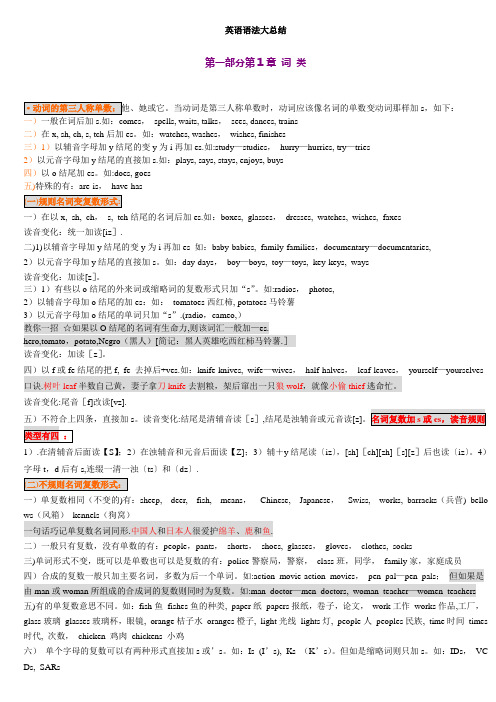
英语语法大总结第一部分第1章词类s,如下:一)一般在词后加s.如:comes,spells, waits, talks,sees, dances, trains二)在x, sh, ch, s, tch后加es。
如:watches, washes,wishes, finishes三)1)以辅音字母加y结尾的变y为i再加es.如:study—studies,hurry—hurries, try—tries2)以元音字母加y结尾的直接加s.如:plays, says, stays, enjoys, buys四)以o结尾加es。
如:does, goes五)特殊的有:are-is,have-has一)在以x, sh, ch,s, tch结尾的名词后加es.如:boxes, glasses,dresses, watches, wishes, faxes读音变化:统一加读[iz].二)1)以辅音字母加y结尾的变y为i再加es 如:baby-babies, family-families,documentary—documentaries,2)以元音字母加y结尾的直接加s。
如:day-days,boy—boys, toy—toys, key-keys, ways读音变化:加读[z]。
三)1)有些以o结尾的外来词或缩略词的复数形式只加“s”。
如:radios,photos,2)以辅音字母加o结尾的加es:如:tomatoes西红柿, potatoes马铃薯3)以元音字母加o结尾的单词只加“s”.(radio,cameo,)教你一招☆如果以O结尾的名词有生命力,则该词汇一般加—es.hero,tomato,potato,Negro(黑人)[简记:黑人英雄吃西红柿马铃薯.]读音变化:加读[z]。
四)以f或fe结尾的把f, fe 去掉后+ves.如:knife-knives, wife—wives,half-halves,leaf-leaves,yourself—yourselves 口诀.树叶leaf半数自己黄,妻子拿刀knife去割粮,架后窜出一只狼wolf,就像小偷thief逃命忙。
三级公共英语语法重点

• would rather+从句,是一个常用的虚拟语 气句型 Would rather+从句,谓语一般用过去 时来表示现在或将来。其意为“宁愿……, 还是…… 好些”“一个人宁愿另一个人做 某事”。引导从句的that常省略。在谈到过 去的动作时,谓语则用过去完成时。
• John wants to see me today. I would rather he came to tomorrow than today. 约 翰今天想去看我。我宁愿他明天来看我而 不是今天。(句中came不是表示过去而是表 示将来)
• No sooner …than 刚一…就 • We had no sooner sat down than we found it was time to go. • No sooner had we sat down than we found it was time to go.
• Now that : since • Now that you are grown up, you must stop this childish behavior. • So… as 像…一样 否定句 • This room is not so large as that one. • So far as 就… • So far as I know, he will be away for three we名词+but also +名词 名词+but +名词
• Not only… + 名词+but also +名词作主语的 结构中,谓语动词与but also 后的名词的数 保持一致。 • Not only his wife but also his children have arrived.
2023年三级英语语法重点
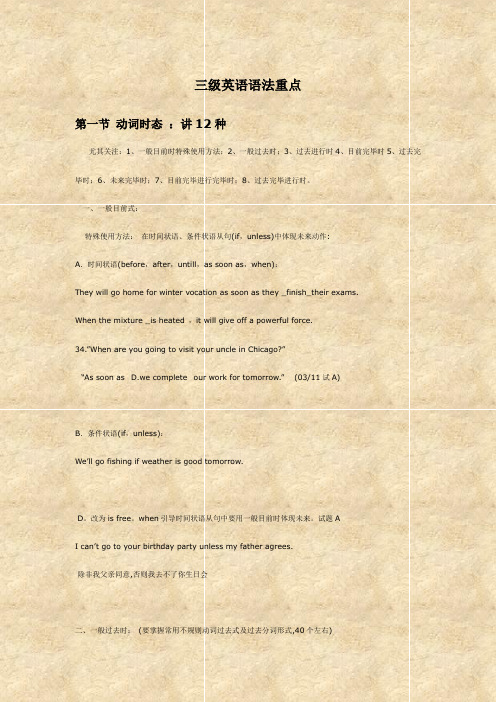
三级英语语法重点第一节动词时态:讲12种尤其关注:1、一般目前时特殊使用方法;2、一般过去时;3、过去进行时4、目前完毕时5、过去完毕时;6、未来完毕时;7、目前完毕进行完毕时;8、过去完毕进行时。
一、一般目前式:特殊使用方法:在时间状语、条件状语从句(if,unless)中体现未来动作:A.时间状语(before,after,untill,as soon as,when):They will go home for winter vocation as soon as they _finish_their exams.When the mixture _is heated ,it will give off a powerful force.34.”When are you going to visit your uncle in Chicago?”“As soon as D.we complete our work for tomorrow.” (03/11试A)B.条件状语(if,unless):We’ll go fishing if weather is good tomorrow.D。
改为is free。
when引导时间状语从句中要用一般目前时体现未来。
试题AI can’t go to your birthday party unless my father agrees.除非我父亲同意,否则我去不了你生日会二、一般过去时:(要掌握常用不规则动词过去式及过去分词形式,40个左右)1、简朴陈说去过动作或状态:would do2、used to do sth 过去常常做(目前不做了);be used to doing 习惯于做……(目前还在做)We used to swim in the river when we were in the countryside.咱们过去常在河里游泳。
(目前不了)The old man is used to getting up early in the morning. 老人习惯早起3、It is …time since +从句引导时间状语从句中,since后谓语动词用一般过去时(自从…以来)54. No one can possibly recall any detail about the meeting. It is at least five years since it C. took place . A卷三、一般未来时1、will(shall)+原形动词:体现未来动作或状态。
全国公共英语三级常见语法

第一节动词的时态一、一般现在时:1、由when、as soon as、the minute、the moment、till、until等引起的时间状语从句,以及由if、unless、provided that等引起的条件状语从句常常用一般现在时态表示将来的动作,而主句则用一般将来时态。
例:They will go home for winter vocation as soon as they finish their exams。
2、当表示普遍的真理或者众所周知的客观事实,常常用一般现在时态。
例:The earth is round。
地球是圆的.二、一般过去时:区分三个短语的用法:1、used to do sth:过去常常做某事。
2、be/get used to doing sth:习惯做某事。
3、be used to do sth:被用于做某事.三、一般将来时:1、be to+动词原形:表示安排或计划好了的动作。
例:The Third-Ring Road is to be open to traffic before National Day.2、be about to+动词原形:表示即将发生的动作。
例:The lecture is about to begin。
讲座即将开始。
3、一些表示动作趋势,如开始、终结,以及一些表示动作方向,如往来的动词,常常用现在进行时态表示按照安排将于将来发生的事情,这类动词常见的有如:start,go,leave,come,arrive等.例:We are leaving for Beijing tomorrow. 我们明天动身去北京。
四、进行时态:重点区分when和while引起的时间状语的用法。
When表示时间上的点,在考试中其引导的时间状语从句多翻译为“这时?”,主句多用进行时态;while引导的时间状语从句多翻译为“正当……时”,该从句用进行时态. 例:One of the guards was sleeping when the general came in, which made him very angry。
三级语法讲义

英语三级考试讲义一.语法1、表示经常发生的动作或存在的状态:常和always, usually, often ,sometimes, every day, every week的等时间状语连用。
例:He goes to work every day. 他每天去上班。
2、表示普遍的真理。
由于是众所周知的客观事实,所以一般不用时间状语。
例:The earth is round. 地球是圆的。
3、有些表示心理状态或感情的动词往往用一般现在时。
例:I don’t think you are right.我以为你错了。
4、在时间、条件状语从句中表示将来的动作:常用的连词有as soon as,when,till,if。
(1)They will go home for winter vacation as soon as they ________their exams.A. have finishedB. finishC. finishedD. was finishing(答案:B)(1996年22题)(2)When the mixture ______, it will give off a powerful force.A. will heatB. will be heatedC. is heatedD. has heated(答案:C)(1992年59题)1.1.2 一般过去时1、表示过去的动作或状态:常和过去时间状语连用。
just now, last year, when I was 8 years old 等。
例:You've already missed too many classes this term .You _____ two classes just last week.A. missedB. would missC. had missedD. have missed(答案:A。
HSK3级语法
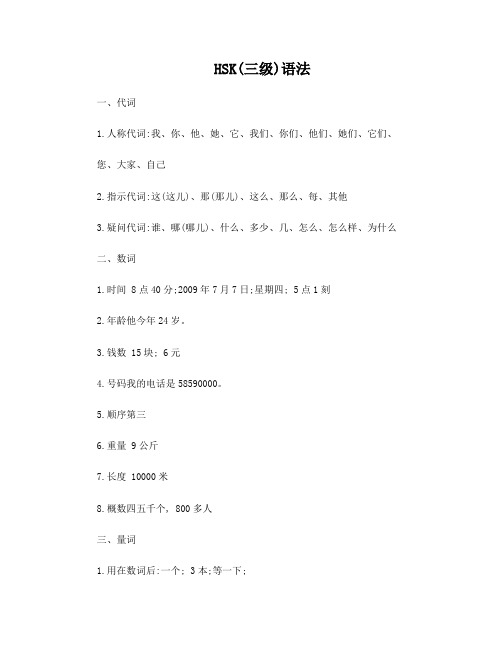
HSK(三级)语法一、代词1.人称代词:我、你、他、她、它、我们、你们、他们、她们、它们、您、大家、自己2.指示代词:这(这儿)、那(那儿)、这么、那么、每、其他3.疑问代词:谁、哪(哪儿)、什么、多少、几、怎么、怎么样、为什么二、数词1.时间 8点40分;2009年7月7日;星期四; 5点1刻2.年龄他今年24岁。
3.钱数 15块; 6元4.号码我的电话是58590000。
5.顺序第三6.重量 9公斤7.长度 10000米8.概数四五千个, 800多人三、量词1.用在数词后:一个; 3本;等一下;一双鞋;两条鱼;第10层; 3角5分;两种2.用在“这”“那”“几”“每”后:这个;那些;几本;每次;3.其他:他坐了一会儿;快一点儿四、副词1.否定、肯定副词:不我不是学生。
没他没去医院。
别你别去游泳了。
一定我明天一定来。
必须我们必须想个好办法。
2.程度副词:很她很高兴。
1太太好了!非常那里的天气非常热。
最我最喜欢喝咖啡。
更明天会更好。
越雨越下越大。
特别这儿的西瓜特别甜。
多么(多)这些孩子多可爱呀!极她唱得好极了!几乎中国的大城市,我几乎都去过。
3.范围副词:都我们都看见那个人了。
一起他们一起去机场了。
一共这些药一共300元。
只我只去过一次北京。
4.时间副词:正在我们正在看电视。
已经他已经到学校了。
就她下星期就回来了。
先我先说几句。
才他晚上11点才下班。
一直他的成绩一直很好。
总是她总是很忙。
马上请安静,节目马上开始。
5.语气副词:也我也有一块这样的手表。
还她还没起床。
真你的字写得真漂亮!终于考试终于结束了。
其实这道题其实很容易。
当然那样做当然不可以。
6.频率副词:再欢迎再来。
又今天他又迟到了。
经常最近他经常去爬山。
五、连词:和我和你因为……所以……因为下雨,所以他没去踢足球。
但是他80岁了,但是身体很好。
虽然房子虽然旧了,但是很干净。
而且她会说汉语,而且说得很好。
然后先吃饭,然后去看电影。
如果如果大家都同意,就这样决定了。
日语三级语法总结

日语三级语法总结1)~は~より~です~比~表示比较,谓语可以是形容词或形容动词日本は中国より小さいです、日本比中国小2)~は~ほど~くない/ではない~不如~助词ほど是以某一事例来表示状态,性质的。
谓语用形容词或形容动词的否定形式秋は夏ほど暑くないです。
秋天没有夏天热3)AよりBのほうが~です~比~更~助词より接在比较的对象后面。
谓语上形容词或形容动词シンセンより上海のほうが広いです。
比起深圳上海要大4)AとBとでは、どちらが~ですか/AとBとどちらが~ですかA和B哪个~表示询问A,B相比较时的句型りんごとなしとどちらが好きですか苹果和梨你喜欢哪一个5)~(の中)では、何がいちばん~ですか在~里,哪个最~果物の中では何が一番好きですか水果里面你最喜欢什么季節の中ではいつが一番好きですか一年四季中你喜欢哪个季节6)…のを見る/聞く接续:动词连体形意思:看/听见……①わたしがやるのを見てください。
请看我的②お父さんがおとうとをほめたのを聞きました。
听到父亲表扬弟弟了7) …でしょう接续:接在名词、形容动词词干,动词和形容词的连体形后意义:表示推测、委婉或者确定的疑问~ 吧推测:①あしたもきっといい天気でしょう。
明天肯定是好天气吧③北京では、いまはもう寒いでしょう。
北京现在已经很冷了吧委婉:④A:おきゃく客さま様、このようなものはいいでしょうか。
客人,这样的东西可以吧B:ええ、いいです。
嗯,可以确定的疑问:⑥今度の旅行、李さんも行くでしょう?这次旅行,小李也去吧8)~から意思:由……做成,组成①日本はおお多くのしま島からなっています。
日本是由很多岛组成的9)~たり、~たりする1、表示在许多动作中,列举1、2例说明又~又~,一会~一会~2、表示举出一例,以示还有其他类似的情况~之类的10)た形+ ほうがいいですない形+ ないほうがいいです还是~为好表示劝说或建议例:病院へいったほうがいいです。
还是去医院为好あまりお酒を飲まないほうがいいです。
大学英语三级考试语法复习要点总结
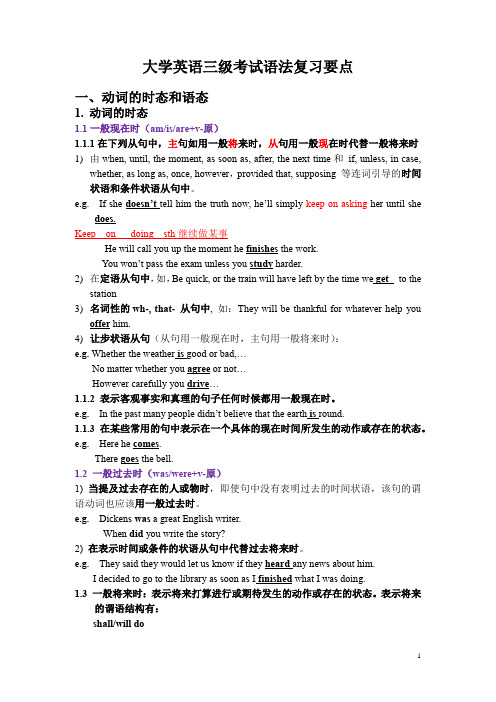
大学英语三级考试语法复习要点一、动词的时态和语态1. 动词的时态1.1一般现在时(am/is/are+v-原)1.1.1在下列从句中,主句如用一般将来时,从句用一般现在时代替一般将来时1)由when, until, the moment, as soon as, after, the next time和if, unless, in case,whether, as long as, once, however,provided that, supposing 等连词引导的时间状语和条件状语从句中。
e.g. If she doesn’t tell him the truth now, he’ll simply keep on asking her until shedoes.Keep on doing sth继续做某事He will call you up the moment he finishes the work.You won’t pass the exam unless you study harder.2)在定语从句中,如,Be quick, or the train will have left by the time we get to thestation3)名词性的wh-, that-从句中, 如:They will be thankful for whatever help youoffer him.4)让步状语从句(从句用一般现在时,主句用一般将来时):e.g. Whether the weather is good or bad,…No matter whether you agree or not…However carefully you drive…1.1.2 表示客观事实和真理的句子任何时候都用一般现在时。
e.g.In the past many people didn’t believe that the earth is round.1.1.3 在某些常用的句中表示在一个具体的现在时间所发生的动作或存在的状态。
英语三级必考语法1

●●我不记得向你借过钱。
●Remember我忘了我见过他。
●Don’t forget●我后悔没有努力学英语.(regret—懊悔,studying表示发生在谓语动作之前.)●I regret我很抱歉不能和你一起去看电影。
(regret—抱歉,to say是指现在。
)1.You were brave enough to raise objections at the meeting。
--Well,now I regret _______ that。
A. to do B。
to be doing C. to have done D. having done1.D regret doing sth (或having done sth)=后悔做……。
Regret to do sth=抱歉或者遗憾做……。
我打算坐飞机去.(propose—打算,go there指自己去。
)●He proposes他建议坐飞机去.(propose—建议;going there是泛指;不见得是他本人.)在need,want,clean,require,to be worth等词后面跟动名词时,一般不用被动,用不定式需用被动。
as-—尽管as引导让步状语从句时,句子通常倒装。
可与though互换as——因为,通常放在句首。
情态动词一、“must do (be)” must be doing"表示对现在情况的推测“must have done (been)"表示对过去情况的推测.二、should/ought to “should/ought to have done (been)。
"表示过去应该做而没有做三、could “could have done(been)"表示过去时间里某个动作或某种情况本来能发生,但事实上并未发生。
四、had better和would rather,would sooner.。
英语三级语法
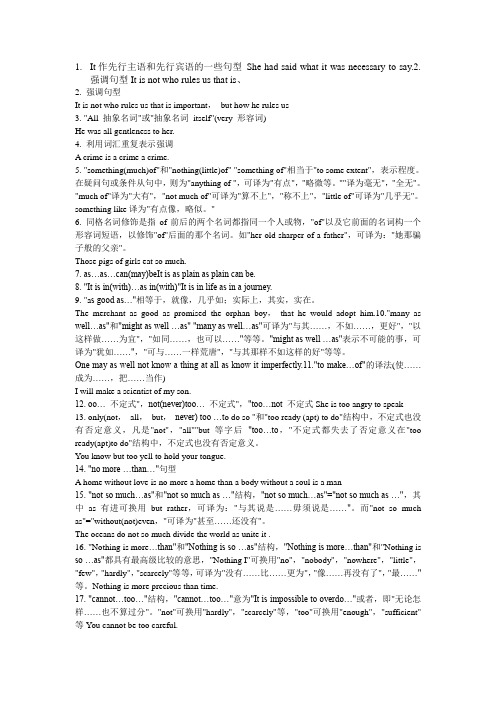
1.It作先行主语和先行宾语的一些句型She had said what it was necessary to say.2.强调句型It is not who rules us that is、2. 强调句型It is not who rules us that is important,but how he rules us3. "All 抽象名词"或"抽象名词itself"(very 形容词)He was all gentleness to her.4. 利用词汇重复表示强调A crime is a crime a crime.5. "something(much)of"和"nothing(little)of" "something of"相当于"to some extent",表示程度。
在疑问句或条件从句中,则为"anything of ",可译为"有点","略微等。
""译为毫无","全无"。
"much of"译为"大有","not much of"可译为"算不上","称不上","little of"可译为"几乎无"。
something like译为"有点像,略似。
"6. 同格名词修饰是指of前后的两个名词都指同一个人或物,"of"以及它前面的名词构一个形容词短语,以修饰"of"后面的那个名词。
如"her old sharper of a father",可译为:"她那骗子般的父亲"。
三级语法——精选推荐
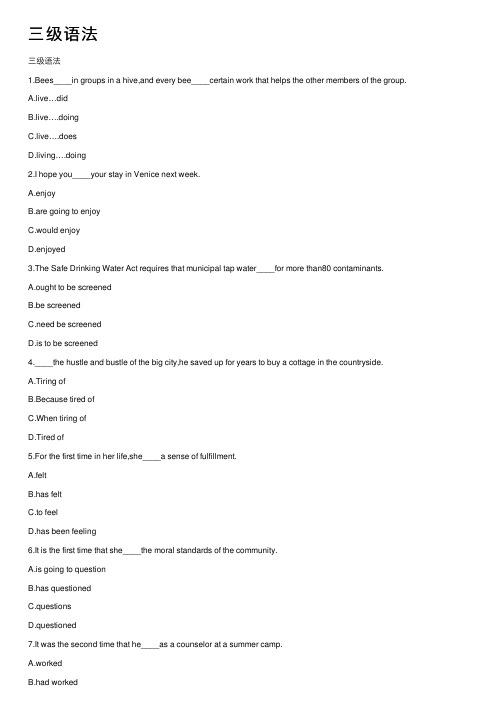
三级语法三级语法1.Bees____in groups in a hive,and every bee____certain work that helps the other members of the group.A.live (i)B.live….doingC.live….doesD.living….doing2.I hope you____your stay in Venice next week.A.enjoyB.are going to enjoyC.would enjoyD.enjoyed3.The Safe Drinking Water Act requires that municipal tap water____for more than80 contaminants.A.ought to be screenedB.be screenedC.need be screenedD.is to be screened4.____the hustle and bustle of the big city,he saved up for years to buy a cottage in the countryside.A.Tiring ofB.Because tired ofC.When tiring ofD.Tired of5.For the first time in her life,she____a sense of fulfillment.A.feltB.has feltC.to feelD.has been feeling6.It is the first time that she____the moral standards of the community.A.is going to questionB.has questionedC.questionsD.questioned7.It was the second time that he____as a counselor at a summer camp.A.workedB.had workedC.could have workedD.must have worked8.The boy listened with amazement until the instructor insisted he____it.A.triedB.tryC.must tryD.would try9.Evidence from a recent study suggests that injuries______most likely to occur at social gatherings right after somebody hollers,“Hey everybody,watch this!”A.should beB.beC.areD.were10.It is a legal requirement that you______insurance for your car.A.haveB.need to haveC.ought to haveD.must have11.Trying to set a good example for this team members,he was always the first one at practice and the last one_____.A.leaving B,having left C.being left D.to leave12.He was said to be the first man_______around the world in a hot air ballon.A.to travelB.travelingC.having traveledD.traveled13.Failures are more likely to hit_______.A.the unready and the luckyB.unready and unluckyC.one unready and unluckeyD.each unready and unluckey14.Her mother believed that it wasn’t until Boyle obtained an acting scholarship______she became more willing to take part in social activities.A.whenB.howeverC.thenD.that15.When he learned that he had no choice but______,Jack muttered under his breath,“I hate this stupid road!”A.to driveB.driveC.drivingD.drives16.While_______college I worked evenings at a retail store,and on slow nights my co-workers Susan would often sing along the radio.A.attendedB.attendingC.to attendD.having attended17.Tom_______fault with the way his life cooks.A.always findsB.has always foundC.always foundD.is always finding18.Why______the milk?Does it smell sour?A.do you smellB.are you smellingC.smellsD.does it smell19.The rescue team reported that the water______cold.A.was feelingB.had been feelingC.feelsD.felt20.The chef______the pudding to see if it was sweet enough.A.was tastingB.is tastingC.should tasteD.tastes21.Jim is enjoying his holiday in the Arctic.He_____touristy places and he_____the cold.A.hated…..didn’t mindB.hated…..was not mindingC.hates……doesn’t mindD.hates……isn’t minding22.Chuck______of emigrating,but I think he should stay where he is.A.thinksB.was thinkingC.is thinkingD.thought23.It is five years since we last_____from him.A.hearB.have heardC.didn’t hearD.heard24.We____you were still on holiday.When did you get back?A.thoughtB.have thoughtC.had thoughtD.think25.The fans____for six hours,and the movie star still hasn’t turned up.A.waitedB.have waitedC.have been waitingD.wait26.The first tourist who____will get a surprise.A.arrivesB.arrivedC.will arriveD.is going to arrive27.Look at the mess you’ve made.Your grandma____a heart attack.A.is going to getB.will getC.getsD.is to get28.Watch out!The roof____A.is to collegeB.is going to collapseC.will collapseD.collapses29.No one___the suspet without the permission of the police.A.is going to contactB.is to contactC.contactsD.contacted30.I____to attend my roommate’s wedding,but something came up.A.had wantedB.have wantedC.wantedD.was to want31.He orders me about as though I____his wife.A.amB.am going to beC.wereD.have been32.He looks as if he_____a decent meal for a month.A.hasn’t hadB.didn’t haveC.hadn’t hadD.was going to have33.It is me_____A.leftB.leaveC.should leaveD.ought to leave/doc/8b8572569.htmlst Sunday we______a barbecue party but it rainedA.were leavingB.hadC.would haveD.were going to have35.We_____the contract when the detective phoned us.A.were going to signB.were going to signC.would signD.have signed36.Charles is gentle by the nature,but_____rude this time.A.isB.is beingC.beingD.seeming37.By the end of next month,they____the financial report.A.would have completedB.will have completed/doc/8b8572569.htmlpleteD.will complete38.They would rather read than_____.A.to talkB.talkingC.talkD.talked39.My sister prefers____to____.A.talking…...readingB.talk……readC.talking……readingD.to talk……read40.--Shall I give you a check?--I’d rather your____cash.A.payB.paidC.payingD.to pay41.Cathy wants to tell Henry,but I’d rather shed____.A.didn’tB.wouldn’tC.won’tD.doesn’t42.A:Do you wat Susan to repai it herself?B:I’d prefer her_____the electricianA.ringB.rangC.to ringD.will ring43.The government doesn’t wish Dr.Smith_____a professorship at a foreign university.A.will acceptB.to acceptC.acceptsD.accepting44.I’m broke.I wish I_____so much money.A.didn’t spendB.hadn’t spendC.haven’t spendD.don’t spend45.Learning difficulty_____in detail in Chapter4.A.will be dealtB.is going to be dealtC.will be dealt withD.will deal with46.The spokesman said that the cases_____.A.was been looked intoB.was being lookedC.was being looked intoD.had been looked47.The superintendent ordered that the areacurve____A.evacuatedB.be evacuatedC.being evacuatedD.to be evacuated48.Bill suggested_____the restaurant but Lucy was against it.A.to sellB.sellingC.should sellD.sell49.Alex suggested that the farm______into a golf course but no one liked the idea.A.should be convertedB.being convertedC.been convertedD.to be converted50.Alan’s parents are still wondering who suggested_____in the car race.A.his taking partB.for his taking partC.his take partD.him to take part51.This instructor forbade_______mobile phones in the classroom.A.to use/doc/8b8572569.htmlingC.for students’usingD.for students to use52.This instructor forbade the students_______mobile phones in the classroom. /doc/8b8572569.htmle/doc/8b8572569.htmledC.to useD.for use53.John is determined to get a ticket even if it means_______in a queue all night.A.standingB.to standC.standD.will have to stand54.When he declined the job offer,he didn’t mean______the company.A.insultingB.wanting to insultC.any insultD.to insult55.I regret_______that this time I cannot promise you anything.A.to sayB.sayingC.have to sayD.must say56.He has always regretted_______the opportunity at college.A.not to have takenB.not having takenC.not to takeD.not take57.She tried______the name of the boy,but was too confused to think of anything.A.to recallB.recallingC.recallD.recalled58.The tourist tried_______something funny to get rid of the embarrassment.A.to talk aboutB.talked aboutC.talking aboutD.even talk about59.Even experts have difficulty_______which depressed patients need protection.A.to decideB.decideC.when to decideD.deciding60.Margaret Mead,who sought_______the young and old to each other in a recent lecture,was sympathetic to the young.A.explainingB.to explainC.explanationsD.explained61.In spite of_______has been said about genetically modified food,most people remain skeptical。
英语三级语法考点

C
(2011.12-19题) Since the new technology was introduced last month, we ______ in speeding up production. A. succeed B. succeeded C. have succeeded D. will succeed
八大基本时态 had+动词过去分词 have/has +动词过去分词
过去完成时用法之表未曾实现的想法
过去完成时可表示过去未曾实现的想法和打算,通常连用的动词是 want, think, hope, plan, mean, expect, intend, suppose 等: I had meant to come, but something happened. 我本想来,但有事就没有来。 I had intended to speak, but time did not permit. 我本想发言,但时间不允许。 We had hoped that you would come to see us, but you didn’t. 我们本想你来看我们的,但你没有来。
真题回放
(11年12月A 17题) Now the air pollution in this city ______ more and more serious with each passing day. A. to become B. became C. becoming D. is becoming (2010.5-17题) According to the time table, the train for Beijing ____ at 9:10 P.m.from Monday to Friday. A) was leaving B) is leaving C) leaves D) has left 注:一般现在时可以表预定的行为
三级语法重点上

三级语法重点第一章动词的时态一、一般现在式:* 1、表示经常发生的动作或存在的状态:常和always, usually, often ,sometimes, every day, every week的等时间状语连用。
例:He goes to work every day. 他每天去上班。
2、表示普遍的真理。
由于是众所周知的客观事实,所以一般不用时间状语。
例:The earth is round.一般时* 3、有些表示心理状态或感情的动词(如,be,think,fear,feel,hate,know,intend,like,live,love,realize,remain, understand)往往用一般现在时。
例:I don’t think you are wrong..我以为你错了。
时态* 4、在时间、条件状语从句中表示将来的动作即(代替将来时):条件状语从句常由as soon as,when,till,if, unless, suppose, in case, so long as来引导(即主句用将来时,从句用一般现在时,表将来)例题* (1)They will go home for winter vocation as soon as they________their exams.A. have finishedB. finishC. finishedD. was finishing(答案:B)(1996年22题)(2)When the mixture ______, it will give off a powerful force.A. will heatB. will be heatedC. is heatedD. has heated(答案:C)(1992年59题)第五* 5,某些表示起始的动词,可用一般现在时表示按规定、计划或安排要发生的动作,这类动词有:be,go,come,start,depart,arrive,begin,leave 等。
大学英语三级语法知识总结汇总
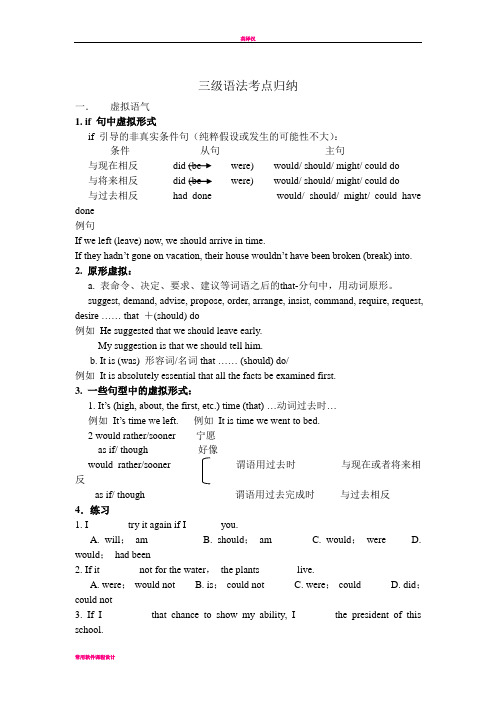
三级语法考点归纳一.虚拟语气1. if 句中虚拟形式if 引导的非真实条件句(纯粹假设或发生的可能性不大):条件从句主句与现在相反did (be were) would/ should/ might/ could do与将来相反did (be were) would/ should/ might/ could do与过去相反had done would/ should/ might/ could have done例句If we left (leave) now, we should arrive in time.If they hadn’t gone on vacation, their house wouldn’t have been broken (break) into.2. 原形虚拟:a. 表命令、决定、要求、建议等词语之后的that-分句中,用动词原形。
suggest, demand, advise, propose, order, arrange, insist, command, require, request, desire …… that +(should) do例如He suggested that we should leave early.My suggestion is that we should tell him.b. It is (was) 形容词/名词that …… (should) d o/例如It is absolutely essential that all the facts be examined first.3. 一些句型中的虚拟形式:1. It’s (high, about, the first, etc.) time (that) …动词过去时…例如It’s time we left.例如It is time we went to bed.2 would rather/sooner 宁愿as if/ though 好像would rather/sooner 谓语用过去时与现在或者将来相反as if/ though 谓语用过去完成时与过去相反4.练习1. I _______ try it again if I_______you.A. will;amB. should;amC. would;wereD. would;had been2. If it _______ not for the water,the plants _______live.A. were;would notB. is;could notC. were;couldD. did;could not3. If I _______ that chance to show my ability, I _______the president of this school.A. have not had;could not becomeB. had not had;would not have becomeC. did not have;could not becomeD. doesn’t have;will not become4. He _______ by that burglar if you _______ to save him.A. might have been killed;hadn’t comeB. will be killed;didn’t comeC. may be killed;did’t comeD. could be killed;haven’t come5. If it _______for your help,I _______that hard time with so little money.A. were not;would not spendB. is not;can not spendC. had not been;would not have spentD. have not been;will not spend6. Where _______ you go if war _______?A. will;breaks outB. do;will break outC. would;were to break outD. will;is to break out7. She wishes she _______ that humiliating thing.A. doesn’t doB. didn’t doC. haven’t doneD. hadn’t done8. The chairman suggested that the meeting _______ put off.A. can beB. beC. isD. will be9. It is vital that he _______ immediately.A. should goB. must goC. goesD. went10. It is time we _______do our homework.A. begin toB. can begin toC. began toD. will begin to答案:1.选C。
英语三级语法汇编
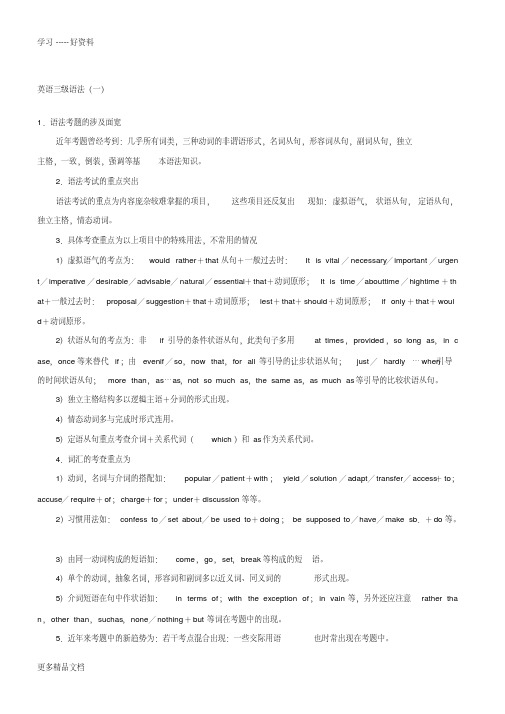
英语三级语法(一)1.语法考题的涉及面宽近年考题曾经考到:几乎所有词类,三种动词的非谓语形式,名词从句,形容词从句,副词从句,独立主格,一致,倒装,强调等基本语法知识。
2.语法考试的重点突出语法考试的重点为内容庞杂较难掌握的项目,这些项目还反复出现如:虚拟语气,状语从句,定语从句,独立主格,情态动词。
3.具体考查重点为以上项目中的特殊用法,不常用的情况1)虚拟语气的考点为:would rather+that从句+一般过去时:It is vital/necessary/important/urgen t/imperative/desirable/advisable/natural/essential+that+动词原形;It is time/abouttime/hightime+th at+一般过去时:proposal/suggestion+that+动词原形;lest+that+should+动词原形;if only+that+woul d+动词原形。
2)状语从句的考点为:非if引导的条件状语从句,此类句子多用at times,provided,so long as,in c ase,once等来替代if;由evenif/so,now that,for all等引导的让步状语从句;just/hardly…when引导的时间状语从句;more than,as…as,not so much as,the same as,as much as等引导的比较状语从句。
3)独立主格结构多以逻辑主语+分词的形式出现。
4)情态动词多与完成时形式连用。
5)定语从句重点考查介词+关系代词(which)和as作为关系代词。
4.词汇的考查重点为1)动词,名词与介词的搭配如:popular/patient+with;yield/solution/adapt/transfer/access+to;accuse/require+of;charge+for;under+discussion等等。
- 1、下载文档前请自行甄别文档内容的完整性,平台不提供额外的编辑、内容补充、找答案等附加服务。
- 2、"仅部分预览"的文档,不可在线预览部分如存在完整性等问题,可反馈申请退款(可完整预览的文档不适用该条件!)。
- 3、如文档侵犯您的权益,请联系客服反馈,我们会尽快为您处理(人工客服工作时间:9:00-18:30)。
第二节被动语态考试重点:感官动词和使役动词的被动语态;动词短语的被动语态;情态动词的被动语态;用主动表示被动的含义。
一、感官动词及使役动词(如:see,feel,hear,watch,make,bid)在主动语态中用无to 不定式做宾补,改为被动语态时要加to。
1、The middle-aged man was seen _____ out of the house on the afternoon of the murder.A. cameB. comeC. to comeD. have come(答案为C)(2000年58题)2、We were made to study harder. 我们被要求努力学习。
二、有些动词后面接一个介词或副词,构成短语。
变被动语态时,短语动词做及物动词用。
1、The children are well looked after. 这些孩子得到了很好的照顾。
2、The doctor has been sent for. 已经派人去请大夫了。
三、情态动词的被动语态构成:情态动词+be+过去分词。
1、The work must be finished before lunch. 这项工作必须在午饭前干完。
2、Nothing can be seen from here. 从这儿什么也看不见。
四、用主动表示被动的含义常用:need/require +doing sth(=to be done)(此句型主语大多为物)例:My room is a mess. It needs _____.A to be tidying up B. tidying up C. to tidy up D. tidied up(答案为B)(2000年47题)第三节情态动词考试重点:情态动词+完成时情态动词用来表示能力、允许、许诺、可能、劝告、意愿等概念或态度。
情态动词无人称变化,在句子中和动词原形一起构成谓语。
根据这几年的考试看,着重测验情态动词接完成时的用法。
一、must +现在完成时表示对已发生的事情的一种肯定的猜测。
1、Mr. Green _____ my letter, otherwise he would have replied before now.A. must have receivedB. must have failed to receiveC. must receiveD. must fail to receive(答案:B)(1998年44题)2、I believe he _____ an accident, otherwise he would have arrived on time.A. would have hadB. could have hadC. should have hadD. must have had(答案为D)(2001年58题)二、should (ought to )+完成时表示应该做的事情而没有做,否定式表示不该做的事情做了。
含有对过去的动作的责备、批评。
1、They have done things they ought _____.A. not to doB. not to be doneC. not to have doneD. not having done(答案为C)(1999年59题)2、I’m sorry I couldn’t get in touch with him before he left, I _____ him earlier.A. had a telephoneB. have phonedC. should have phonedD. should be phoned (答案为C)(2000年26题)三、could +完成时表示能做的事情而没有做。
表示对过去能做而未做的事情感到惋惜,遗憾。
1、He could have joined us, but he didn’t get our invitation in time.他本来能够参加我们的,但是他没有收到我们的请贴。
2、I could have passed, but I did not study hard enough.我本来能及格的,但是没有努力学习。
第四节虚拟语气如果所表示的条件根本不可能实现或实现的可能性很小时,称为虚拟条件句。
考试重点:虚拟语气的基本形式和用法;if的省略形式;含蓄条件句;以wish(that)引导的表示“愿望”的宾语从句;would rather 引导的从句;以as if, as though 引导的从句;以suggest, advise, insist 等词后引导的宾语从句;It is necessary(important)that引导的主语从句;It is time (that)…句型中。
一、虚拟语气的基本形式和用法:虚拟(条件)语气中,主句与从句中谓语动词的形式可分为下面三类:1、I would ask George to lend us the money if I _____ him.A. had knownB. have knownC. knewD. know(答案:C。
与现在的事实相反,从句用过去时)(1995年38题)2、Do you think there would be less conflict in the world if all people _____ the same language?A. spokeB. speakC. had spokenD. will speak(答案:A。
与现在的事实相反,从句的谓语动词用过去时。
)3、If Bob____ with us, he would have had a good time.A. would comeB. would have comeC. had comeD. came(答案为C。
与过去的事实相反,从句的谓语动词用过去完成时。
)(1995年59题)二、if的省略形式在虚拟条件句中,如谓语包含were , had, should等词,则可以把这些词放到主语前面,省略if。
1、_____ you were busy, I wouldn't have bothered you with my questions.A. If I realizedB. Had I realizedC. Did I have realized thatD. As I realized(答案:B。
虚拟条件句有时可以省略if,而将谓语中的过去式were,had,或should等移至主语之前。
)(1996年39题)2、_____, I should ask them some questions.A. Should they come to usB. If they come to usC. Were they come to usD. Had they come to us(答案:A。
与将来事实相反。
)(1997年30题)三、含蓄条件句有时一个假设的情况不用条件从句表示,而用其它方式来表示,这样的句子叫含蓄条件句。
常用with,without,but for。
1、Without your help, we _____ so much.A. didn’t achieveB. would not have achievedC. will not achieveD. don’t achieve(答案:B。
这是一句含蓄条件句,条件暗含在介词短语without your help中,因此要用虚拟语气。
)(1996年33题)2、But for the rain, we _____ a nice holiday.A. should haveB. would have hadC. would haveD. will have had(答案:B。
2003年28题)四、以wish(that)引导的表示“愿望”的宾语从句wish后的宾语从句中要用虚拟语气,而在虚拟语气中时态的应用类似在非真实条件中从句时态的应用。
表示现在或将来的愿望用:主语+wish +从句(主语+过去时);表示一个过去没有实现的愿望用:主语+wish +从句(主语+过去完成时);1、Peter wishes that he _____ law instead of literature when he was in college.A. could studyB. studiedC. had studiedD. would study(答案:C)(2000年53题)2、I didn’t go to the party, but I do wish I _____ there.A. wereB. would beC. had beenD. will be(答案:C)(2001年53题)五、would rather+句子(过去时)1、I’d _____ you didn’t touch that, if you don’t mind.A. ratherB. betterC. happierD. further(答为案:A)(1998年45题)2、I am too busy these days. I would rather all of you _____ next month for a dinner.A. comeB. would comeC. cameD. have come(答案为C)(2002年46题)六、以as if,as though引导的从句在as if,as though引导的从句中,如果谈论的是不可能或不真实的情况时,它们所引用的状语从句要用虚拟语气,动词形式和wish 后面的从中动词形式变化相同。
1、He talks as if he _____ everything in the world.A. knowsB. knewC. had knownD. would have known(答案:B。
as if(though)从句中非真实性情况用虚拟语气。
本句表示说话人对现在的情况有所怀疑,所以用过去时。
)2、You are talking as if you had seen them你谈的那么起劲,好像你真的见过似的。
(表示想象中的过去的动作)七、以suggest,advise,insist等词后引导的宾语从句中,从句的谓语动词要用should+动词原形,should可以省略。
类似的动词有:propose,insist,suggest,order,demand,require,request等。
